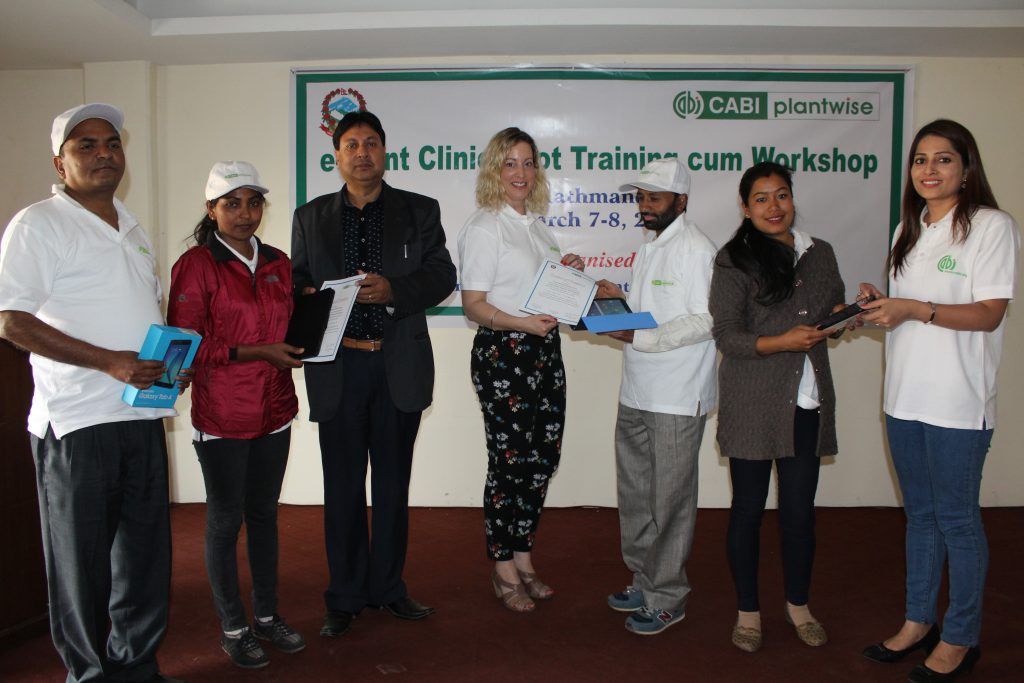How does communication and its technical content shape farmer responses to plant clinic advice?
A recent study led by CABI and published in International Journal of Agricultural Sustainability, explores how communication and its technical content shape farmers’ response to advice delivered at plant clinics. How willing were farmers to accept or reject the technologies recommended at plant clinic consultations? And what were the reasons? The research was carried out…
Al Jazeera visits plant clinics in Nepal
Al Jazeera correspondent Gelareh Darabi recently travelled to Nepal for the broadcaster’s Earthrise programme, to see how plant clinics in Pokhara are helping farmers deal with crop pests such as tuta absoluta. Visit the Al Jazeera website to read the related article→
How tablets are transforming Nepal’s plant clinics
I meet Man Bahadur Chhetri and his assistant on a bright Sunday morning as they are setting up the e-plant clinic in Gorkana, on the outskirts of Kathmandu. On the drive over, I saw plenty of maize being grown on smallholder plots and, here and there, tomatoes in polytunnels. Around the corner from the clinic,…
Successful e-Plant Clinic launch in Nepal
E-plant clinic training commenced in Pokhara, Nepal, today, after a successful launch in Kathmandu earlier this week. ICT intervention for the country is funded by the Centre for Applied Crop Science (CACS), UK Government and training was inaugurated in Kathmandu by Dr. Suroj Pokharel, Secretary, Ministry of Agricultural Development and chaired by Sh. Dila Ram…
Challenges and Opportunities for Women Farmers in Nepal
In developing countries, rural women play a significant role in agriculture, accounting for 60-80% of food production and selling food products at markets [1]. In Nepal, it’s been reported that up to 98% of women are employed in the agricultural sector, a percentage which is higher than that for men (91%) [1b]. Contribution by women…
Sharing experiences of mitigating the impacts of Tuta absoluta
Contributed by Kritika Babbar, CABI India Climate change has emerged as one of the most important environmental, social and economic issues today – especially for South Asia, which is highly impacted by these changes. In light of this, an international conference on Biodiversity, Climate Change Assessment and Impacts on Livelihood (ICBCL) was convened in Kathmandu…
Farmer field schools to link with plant clinics in Nepal
Contributed by Vinod Pandit, CABI Nepal After a successful pilot phase in Nepal, with plant clinics in 45 districts reaching more than 5000 farmers, Plantwise is now looking to scale up and become sustainable by getting partners to commit resources to the programme. To maximise synergies with existing agricultural extension methods, partners have suggested linking…
Ghanaian droughts foreseen and Nepali floods that have been
Article by Sebastian Avery. Hope leaves Ghanaian farmers as another expected late rainfall leads to the possibility of drought. We can only pray that history does not repeat itself. As some of you may know 2007 was disastrous for Ghanaian farmers especially those living in the White Volta Basin. This is because a very similar…
National Plant Protection Organisations to share their experiences of Plantwise with IPPC delegates
This week, the International Plant Protection Convention (IPPC) is holding its 8th session of the Commission on Phytosanitary Measures (CPM8) at the FAO headquarters in Rome. This conference will be a chance for members to discuss current plant protection issues, particularly with regard to plant pests. Plantwise has been invited to host a side event…
Plantwise Photo Of The Month – February
To read more about plant clinics in Nepal and to watch a video of a plant clinic in action, click here. To find out more about plant pests and diseases in Nepal visit the Plantwise Pest Distribution map
- « Previous
- 1
- 2
- 3



